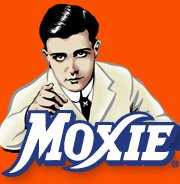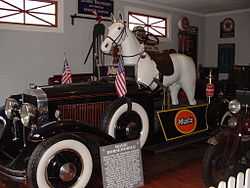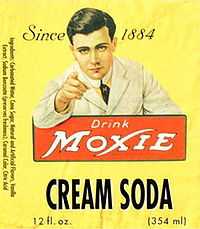Moxie
| Manufacturer |
Cornucopia Beverages/Moxie Beverage Company[1] (Kirin Brewery Company) |
|---|---|
| Country of origin | United States |
| Introduced | 1876 |
| Discontinued | Moxie Cherry Cola, Moxie Cream Soda, Moxie Orange Cream |
| Color | Caramel |
| Variants | Diet Moxie, Moxie Energy, Moxie Energy Citrus, Moxie Energy Explosion, Moxie Energy Thunder, Olde New England Seltzer, Moxie Blue Cream |
 | |
| Type | Private |
|---|---|
| Industry | Beverage |
| Headquarters | Bedford, New Hampshire, U.S. |
| Area served | Eastern United States |
| Website | DrinkMoxie.com |
Moxie is a carbonated beverage that was an early example of mass-produced soft drinks in the United States. It continues to be regionally popular today.
Moxie's flavor is unique, as it is not as sweet as most modern soft drinks and is described by some as "bitter." Moxie is flavored with gentian root extract, an extremely bitter substance which was reputed to possess medicinal properties.
Moxie is closely associated with the state of Maine and was designated the official soft drink of Maine on May 10, 2005.[2] Its creator, Dr. Augustin Thompson, was born in Union, Maine, but Moxie was invented and first produced in Lowell, Massachusetts.[3]
History
Moxie originated as a patent medicine called "Moxie Nerve Food,"[4] which was created around 1876 by Dr. Augustin Thompson in Lowell, Massachusetts.[3] Thompson claimed that it contained an extract from a rare, unnamed South American plant, which had supposedly been discovered by a friend of his, Lieutenant Moxie,[4] who had used it as a panacea. Moxie, he claimed, was especially effective against "paralysis, softening of the brain, nervousness, and insomnia."[4]
After a few years, Thompson added soda water to the formula and changed the product's name to "Beverage Moxie Nerve Food." By 1884 he was selling Moxie both in bottles and in bulk as a soda fountain syrup. He marketed it as "a delicious blend of bitter and sweet, a drink to satisfy everyone's taste."[5]
A lawsuit was filed in 1907 by the Moxie Nerve Food Company of New England against the Modox Company and others, alleging that they had copied the ingredients of Moxie and were using the name "Modox,"[6] which closely resembled "Moxie," and were infringing upon patents and trademarks.[7] The suit was dismissed by the judge, who said the court could not protect the legitimate part of the plaintiff's business in this case. In a later case in New York, the Moxie Nerve Food Company won a lawsuit against Modox, which subsequently went out of business.[6]
President Calvin Coolidge was known to favor the drink, and Boston Red Sox slugger Ted Williams endorsed it on radio and in print. The company also marketed a beverage called "Ted's Root Beer" in the early sixties. Author E. B. White once claimed that “Moxie contains gentian root, which is the path to the good life.”[8] Currently, one of the ingredients of Moxie is “Gentian Root Extractives,” which may contribute to the drink's unique flavor.[9]
The brand suffered a significant decline in sales during the 1930s, which is thought to have been caused by the company's decision to expand its sugar reserves at the expense of its popular advertising campaign.
The Catawissa Bottling Company in Catawissa, Pennsylvania, is one of six bottlers in the United States that produce Moxie. Catawissa has produced it since 1945.[10] Polar Beverages also bottles Moxie in Worcester, Massachusetts.[11]
Since 1962
Sugar-free Diet Moxie was introduced in 1962, about the same time that Mad magazine began placing the Moxie logo in the background of its articles to increase public awareness of it. As a result of Mad ’s efforts, sales of the soft drink increased 10%;[citation needed] this led to the "Mad About Moxie" campaign.[12]
The Moxie brand was purchased in 1966 by the Monarch Beverage Company of Atlanta. In 2007 Monarch sold it to its current owner, Cornucopia Beverages of Bedford, New Hampshire, which is owned by the Coca-Cola Bottling Company of Northern New England, a subsidiary of the Kirin Brewery Company, based in Tokyo.[13]
In its decision to step up efforts to distribute the product, Cornucopia cited increasing requests for Moxie from fans across the country. In 2007 it launched pilot sales in Florida and in 2010 granted distribution in Florida to Florida Micro Beverage Distributors.[14]
In 2011 Cornucopia created the Moxie Beverage Company to market Moxie and Moxie-branded products. A website, DrinkMoxie.com, was created to promote Moxie. Drink recipes using Moxie were created.
Demand for Moxie has waned in recent years, although the brand persists in New England and Pennsylvania.
Advertising

Through extensive advertising, the neologism "moxie" has entered popular American usage with the meaning "courage, daring, or spirit,"[15][16] as in "This guy's got moxie!"
In its advertising, Moxie used “Make Mine Moxie!” advertising jingles, the slogan “Just Make It Moxie for Mine,” and a “Moxie Man” logo. The Moxie Man had appeared on Moxie labels since the beverage was first sold. But in 2010 the Moxie Man logo was removed from labels because it was thought to be too old-fashioned. In 2011 the company's head of marketing, Ryan Savage, made the executive decision to bring the logo back in response to complaints from long-standing customers.[17]
A unique advertising tool was the Moxie Horsemobile, a modified automobile whose driver sat on a large model of a horse. The first Horsemobiles were deployed around 1918. A 1935 Rolls-Royce Moxie Horsemobile was sold for $55,000 at the May 20, 2011, Mecum Auction in Indianapolis, Indiana. Moxie at one time maintained about two dozen of them, and they appeared in parades and other public functions.
Popular culture
The word moxie has become a slang term that means "courage, daring, or spirit."[15][16]
There is a Moxie museum in Union, Maine, which houses a 30-foot-tall wooden Moxie bottle, once used as a soda stand, and other historical Moxie artifacts. This is an annex to the Matthews Museum of Maine Heritage, which is located at the Union Fairgrounds.
Every summer, "all things Moxie" are celebrated at the Moxie Festival in Lisbon Falls, Maine.
In the video game franchise Borderlands, there is a character named Mad Moxie. She is depicted as a somewhat middle aged woman who wears geisha face paint and a female ringmaster's costume. She runs a bar, as well as a Colosseum-style arena called Mad Moxie's Underdome where she pits mercenaries, bandits, and various violent animals against one another and then broadcasts the fights across the entire planet.
Moxie is mentioned in the independent film Man with a Plan (1996) as the favorite beverage of the titular dairy farmer and congressional candidate.
In the movie Small Apartments (2012), the character Franklin Franklin drinks only Moxie and nothing else.
In the role playing game Eclipse Phase, Moxie is a game mechanic that "represents your character's inherent talent at facing down challenges and overcoming obstacles with spirited fervor."
In the MMORPG Kingdom of Loathing, Moxie is a character stat important to Disco Bandits and Accordion Thieves. The stat is used for ranged combat, dexterity, and dodging.
In Stephen King's novel 11/22/63, Moxie and the Moxie festival are mentioned in Chapter 2, Part 4.
John Hodgman on the Judge John Hodgman podcast frequently appeals to Moxie (referring to it as the "Moxie Soda Corporation") for sponsorship and free items, threatening to turn on them unless they comply. As of 29th January 2014, these requests have gone unanswered by any party.
Derivative products

There is also a Moxie Energy Drink and a variety of "Olde New England Seltzers." The energy drink is citrus-based; it lacks Moxie's gentian root tang, caramel color, and (as of 2008) its distinctive branding; similarly, the waters are simply carbonated waters with fruit flavors marketed under the Moxie brand.
Moxie ice cream is also seasonally available in Maine in limited quantities[18] and is mild in flavor as compared to the soft drink.
References
- ↑ Moxie Privacy Policy
- ↑ State Symbols, maine.gov.
- ↑ 3.0 3.1 "Moxie Soda, Created in Lowell, Massachusetts | Lowell.com"
- ↑ 4.0 4.1 4.2 Mark Pendergrast: For God, Country and Coca-Cola, Charles Scribner's Sons, New York, 1993, ISBN 978-0-465-05468-8
- ↑ Anne Cooper Funderburg (2001), Sundae best: a history of soda fountains, Popular Press, pp. 67–68, ISBN 978-0-87972-854-0.
- ↑ 6.0 6.1 Modox drink website
- ↑ "Moxie Nerve Food Company of New England v. Modox Co. et al. : Circuit Court, District of Rhode Island, February 20, 1907", The Federal Reporter, v.151-152, 1907, pp.493-509.
- ↑ "Make Mine Moxie", written at Harvard-Radcliffe, Perspective (Cambridge, Massachusetts), November 2001, retrieved October 9, 2007
- ↑ "Moxie For Mine: More About Moxie the Drink"
- ↑ Abelson, Jenn (August 5, 2007), "Can a bitter taste find sweet life again? Unique N.E. soda Moxie thirsting for a revival", The Boston Globe, retrieved 2007-08-15
- ↑ Polar Bev Partner Products, retrieved 2011-08-18
- ↑ Dun's Review. Dun and Bradstreet. January 1968. p. 56.
- ↑ Paiste, Denis (2007-04-06). "Moxie, same taste, new owner" (reprint). New Hampshire Union Leader (Union Leader Corporation). p. B3. Retrieved 2007-11-25.
- ↑ "Florida is getting some Moxie", AP via boston.com, December 8, 2010. Retrieved 2010-12-08.
- ↑ 15.0 15.1 The Chambers Dictionary, 1993, ISBN 0-550-10255-8
- ↑ 16.0 16.1 Defined in the Merriam-Webster Online Dictionary.
- ↑ https://sites.google.com/site/historyofmoxie/
- ↑ Wagner, Debra. "Moxie Ice Cream "You 'Betcha' It's Wicked Good"". The Lisbon Reporter. Retrieved 2013-10-13.
Further reading
- Bowers, Q. David, The Moxie Encyclopedia, Vestal Press, 1985. ISBN 978-0-911572-43-8
- Grace, Roger M., "Is Hires the Longest Marketed Soft Drink? Or Moxie? Or...?", Metropolitan News-Enterprise newspaper, Los Angeles, Thursday, November 17, 2005, p. 15
- Potter, Frank N., The Book Of Moxie, Paducah, KY : Collector Books, 1987. ISBN 0-89145-348-2.
External links
| Look up moxie in Wiktionary, the free dictionary. |
- Moxie info
- Moxie facts
- "Make Mine a Moxie!" — Maine Farmhouse Journal, July 6–10, 2000